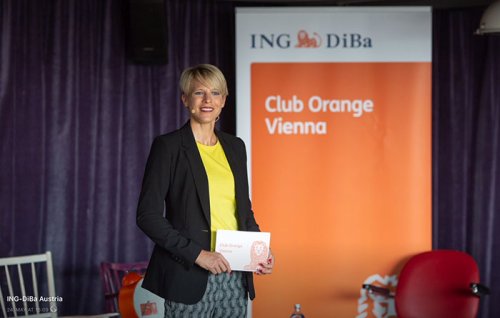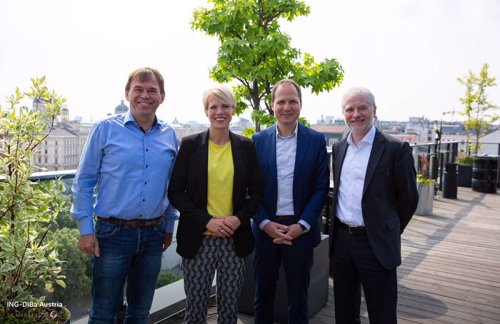‘Greening’ the finance sector in Austria
26 June 2018
For the best view of Vienna, nothing beats the rooftop bar of the 25hours Hotel. By night, it’s a magnet for hipsters and partygoers. By day, it’s the perfect venue for a business meeting.
And it was here that ING in Austria hosted a breakfast earlier this year for representatives of the government and banking industry.
Over croissants and fresh salmon, around 40 guests chatted about current topics in banking while admiring the panoramic view of the capital.
For ING, a challenger in the Austrian banking market with just 260 employees there, it was an important chance to establish relationships with key people in Austrian politics.
The effort has paid off.
After the event, Valerie Hauff-Prieth, ING’s director public affairs in Austria, stayed in touch with some of the people she had met. Then one day she heard that the Ministry of Sustainability was working on a Green Finance Agenda — and she quickly set up a meeting with them.

Austria’s Director Public Affairs Valerie Hauff-Prieth at the first Orange Club Vienna earlier this year.
Putting green finance on the agenda
Austria is no laggard when it comes to sustainability. Over 70% of its electricity already comes from renewable sources, one of the highest percentages in Europe.
But the new Austrian government, in power since December 2017, has ambitious goals. For example, by 2030 it wants 100% of its electricity to come from renewable sources. Another goal is to reduce Austria’s greenhouse-gas emissions by a third compared to 2005.
To achieve this, the government plans massive new investment in green infrastructure, energy storage, energy efficiency and clean technologies.
But public investment alone won’t do the trick. The government realises that it must drastically increase private investment, especially in green finance, a market that barely exists in Austria.
So accompanied by several senior bankers from Wholesale Banking in Germany and Austria, Valerie presented ING’s ideas to the cabinet staff of the federal minister for sustainability in early 2018.
“The talks were a great success. The cabinet staff was very interested in green bonds and sustainability ratings, and our know-how and expertise in sustainable finance were very well received,” she said. “Green finance has not been on the political agenda in Austria so far, so homegrown banks haven’t been able to provide this kind of knowledge.”
Shortly thereafter, ING was the only bank invited to advise the Austrian government on developing a more active green-finance market.
Several of our proposals were included in Austria’s final strategy paper. These include reviewing Austria’s existing regulations to see if they pose any barriers to green-finance projects (and then doing something about it). Another proposal is for the government to consider doing a green-bond pilot and then use the proceeds to invest in new renewable-energy projects.

Participants at the first Orange Club Vienna, a meeting series created by ING in Austria in 2018 for bankers and politicians.
Part of the bigger picture
For now, Austria’s Green Finance Agenda, which includes these and other proposals, lacks detail. That will change next year when the government plans to develop a concrete action plan following a period of stakeholder dialogue.
“It’s our goal to play a part in this dialogue to make sure it has the best possible outcome for ING,” said Valerie.
As we continue to build our relationship with the Austrian government, ING’s expertise in sustainability and green finance is just one asset. The other is our size.
“We are perceived more and more as ‘ING the global bank’, a bank much bigger than just ING in Austria,” said Edward van der Woerd, a member of the Regulatory Affairs team in Austria.
“You notice that people see that: that we’re part of the bigger picture and are influencing the debate here.”

